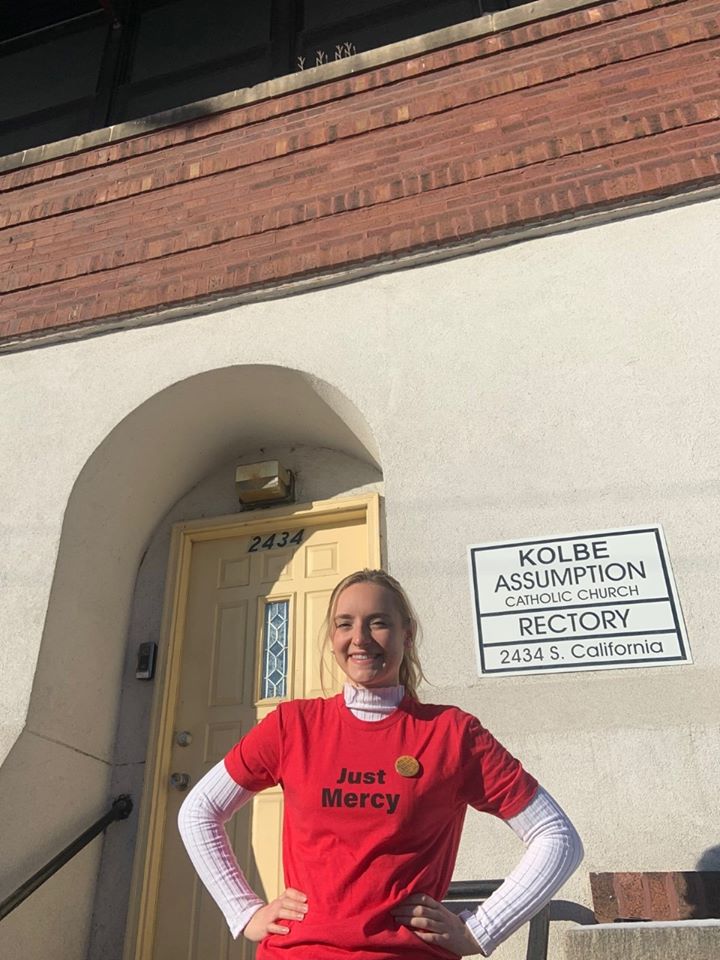I learned more about God going to jail than I ever learned in 21 years of going to the Catholic church down the street from my house or the chapel in the basement of my dorm in college.
But let me back up. This story begins with a common saying and a common distaste. The saying? “There are no atheists in foxholes.” The distaste? Theists and non-theists alike are suspicious of “foxhole faith,” or religious commitments made in the context of intense personal crises.
I often think that priests who give sermons saying we must have faith before we are in a crisis, and after we are in a crisis, to have true religious commitment- well, I think they must have never been in a real foxhole. The foxholes modern day equivalent, jail, is where I want to take you today to explore this aphorism. Is faith really that black and white, or are we trying to paint a world full of color using only two shades, forgetting the color gray?
I’ve learned many things from my year as a Kolbe House minister in the jail, but I’m going to stick to telling you three main points.
1. Gratitude is a religion of its own, and no one does gratitude better than someone with very little to be grateful for.
When I lead groups in the jail, we always end with a gratitude round. This looks like me passing around a yellow squishy ball, and each woman saying three things they are grateful for, or passing. No one ever passes. Out of all the activities we do, gratitude is the only one with a 100% participation rate. If you were a fly on the wall in the Cook County Jail, this is what you would hear week after week from different women. “I’m grateful to be alive.” “I’m grateful God woke me up this morning.” “I’m grateful that God isn’t done with me yet.” When the yellow gratitude ball is in my court, let me tell you, the simple fact that I am still breathing does not pop into my head. I think about the good breakfast I had earlier, or the fun plans I have the weekend ahead, or the workout I smashed out the night before. Holding continued life in one hand, and good morning coffee in the other, it’s easy to see which one is the most vital. Literally. These gratitude rounds remind me that faith is much simpler than we try and make it on the outside. In jail, waking up in the morning is a miracle. It means God isn’t done with you yet. And gratitude means returning to the miracles of our existence, not the facts of everyday life. These women have so little to be grateful for, but each week, gratitude rounds are like a breath of fresh air in the recycled air of a small, concrete room.
2. Human beings have selective hearing.
Over and over again, women who have strong faith while in jail tell me that they saw God moving in their life before they ended up in Cook County Jail, but didn’t listen. They tell me that God “sat them down,” that they needed to be brought to Division 5 Tier 2M for a chat with her. They’ll say: “I was too wrapped up in the drugs, the hustle, the men- I never would have heard God or witnessed God if I hadn’t ended up here. And I wouldn’t be clean.”
Now, I would never say this to someone- that they had to go to jail to find God. That’s crazy talk, as the detainees say. But this truth is what those who have faith in a foxhole preach. The sermons of Cook County Jail are shaped by a common thread: humanity chooses to hear what is convenient for them. God is not a convenient thought; her intervention can change our life in ways we don’t always want or aren’t ready for. In knowing this, I have learned that foxhole faith in no way is a convenient faith, just for when men or women need God. Theists and non-theists alike are wrong about this assumption. C.S. Lewis puts it this way: God whispers to us in our pleasures, speaks in our conscience, but shouts in our pains: it is [her] megaphone to rouse a deaf world.
3. Faith in a hopeless place does not look hopeless.
When I’ve closed my eyes the past two months, separated from the people who I have come to love visiting every Tuesday and Thursday, I transport myself to a scene of joy. The beginning musical notes of You Say by Lauren Daigle ricochets off mental benches and tables. I look around at the women, embarrassed at my music choice, assuming they are sick of hearing Lauren Daigle. Soloma meets my eyes- she is mouthing You Say with excitement. Many women have closed their eyes and begun swaying, hand on heart. When the chorus hits, Nicole stands up, spreading her arms, joining voice with Lauren, singing:
“You say I am loved when I can’t feel a thing
You say I am strong when I think I am weak
And You say I am held when I am falling short
When I don’t belong, oh, You say I am Yours
And I believe, oh, I believe
What You say of me”
Behind my closed eyes, I imagine tears mixed with smiles and laughter. This is how I understand faith now. It is both hopeless and hopeful, joyful and tearful. I’ve learned that laughter is a very underrated tool for healing, and that Christ is encountered more in the gray areas than the black and white.
Many of us are in a foxhole right now. This global pandemic has given us a taste of what it feels like to have our backs against a wall. If you found yourself getting on your knees for the first time in a long time, in a moment of crisis, I want you to know that your faith is as valid as someone who went to mass every Sunday their entire life. In fact, it might be time for us to start learning from the women of the Cook County Jail and practicing foxhole faith: being grateful for our mere existence, hearing and listening for God in our pain, and finding joy in a hopeless place.

